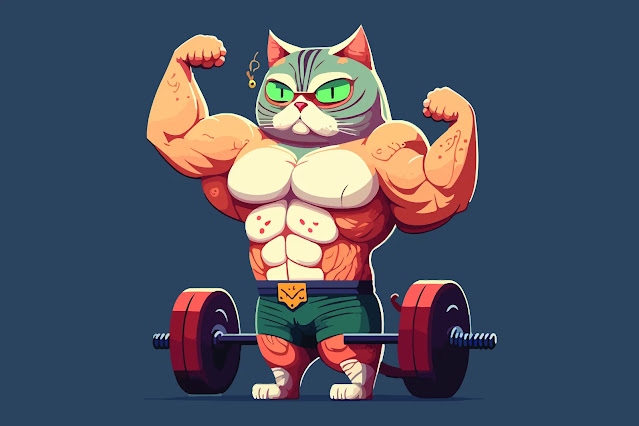The Benefits of Bodybuilding for Your Overall Health
Bodybuilding is an excellent form of exercise that can provide a multitude of benefits for your overall health. First and foremost, bodybuilding can help you build muscle mass and improve your strength, which can make everyday activities easier and more enjoyable. Additionally, bodybuilding can help you lose weight and reduce your risk of chronic diseases like Type 2 diabetes and heart disease. Bodybuilding can also improve your mental health by reducing stress and anxiety and boosting your self-confidence.
The Importance of Proper Nutrition for Bodybuilding:
To achieve your bodybuilding goals, it's essential to follow a proper nutrition plan. This means consuming a diet that's rich in protein, healthy fats, and complex carbohydrates. Additionally, it's important to stay hydrated by drinking plenty of water throughout the day. Proper nutrition can help you build and maintain muscle mass, increase your energy levels, and improve your overall health.
Key Exercises for Bodybuilding:
When it comes to bodybuilding, there are certain exercises that are particularly effective at building muscle mass and improving your strength. These include compound exercises like squats, deadlifts, and bench presses, which work multiple muscle groups at once. Additionally, isolation exercises like bicep curls and triceps extensions can help target specific muscles and improve your overall muscle definition.
The Importance of Rest and Recovery in Bodybuilding:
While exercise is essential for bodybuilding, it's equally important to give your body time to rest and recover. This means taking rest days between workouts, getting enough sleep each night, and giving your muscles time to repair themselves after intense exercise. Proper rest and recovery can help prevent injury, improve your overall performance, and ensure that you're able to achieve your bodybuilding goals safely and effectively.
Tips for Getting Started with Bodybuilding:
If you're new to bodybuilding, it can be overwhelming to know where to start. To get started, it's important to set realistic goals, develop a proper nutrition plan, and create a workout routine that's tailored to your individual needs and abilities. Additionally, it can be helpful to work with a personal trainer or join a bodybuilding community to get support and guidance as you work towards your goals.
Recommended nutrition plans that are commonly used in bodybuilding:
High-Protein Diet: Bodybuilders often follow a high-protein diet to help build and maintain muscle mass. This typically involves consuming 1-1.5 grams of protein per pound of bodyweight, which can be obtained from sources like lean meats, poultry, fish, eggs, dairy products, and plant-based protein sources like beans, lentils, and tofu.
Carb Cycling: Carb cycling involves alternating between high-carb and low-carb days to help optimize muscle growth, fat loss, and energy levels. On high-carb days, bodybuilders typically consume 2-3 grams of carbs per pound of bodyweight from sources like whole grains, fruits, and vegetables. On low-carb days, they may consume fewer than 100 grams of carbs to help promote fat loss.
Flexible Dieting: Flexible dieting, also known as "If It Fits Your Macros" (IIFYM), involves tracking macronutrient intake (protein, carbs, and fat) to ensure that you're consuming the right amount of each nutrient for your goals. This allows for greater flexibility in food choices, as long as you stay within your daily macronutrient targets.
Clean Eating: Clean eating involves consuming whole, unprocessed foods to support overall health and well-being. This typically involves consuming a diet rich in fruits, vegetables, lean proteins, healthy fats, and complex carbohydrates, while limiting processed foods, refined sugars, and artificial additives.
It's important to note that the best nutrition plan for bodybuilding will depend on your individual goals, preferences, and needs. Consulting with a registered dietitian or certified sports nutritionist can help you develop a personalized nutrition plan that's tailored to your unique needs and goals.
When it comes to choosing registered dietitians or certified sports nutritionists.
Ask for Referrals: Ask your doctor, trainer, or friends who are involved in bodybuilding if they can recommend a registered dietitian or certified sports nutritionist.
Check Professional Associations: Look for a registered dietitian or certified sports nutritionist who is a member of a professional association such as the Academy of Nutrition and Dietetics or the International Society of Sports Nutrition. These organizations have directories of registered dietitians and certified sports nutritionists.
Search Online: Use online search engines to find registered dietitians and certified sports nutritionists in your area. Be sure to read reviews and check credentials before choosing a professional.
Before scheduling an appointment, make sure to ask about their experience working with athletes and bodybuilders, their areas of expertise, and their approach to nutrition. It's important to find a professional who understands your unique needs and can provide personalized guidance to help you achieve your bodybuilding goals.
What complementary medications that can be used in bodybuilding?
While there are many supplements marketed as complementary medications for bodybuilding, it's important to note that not all of them are safe or effective. Additionally, the use of supplements is not regulated by the FDA, so it's important to do your research and consult with a healthcare professional before taking any new supplements.
Here are a few commonly used supplements in bodybuilding:
Creatine: Creatine is a naturally occurring compound that's found in muscle cells and is involved in energy production. Supplementing with creatine has been shown to increase muscle strength and size, improve athletic performance, and enhance recovery. However, it's important to note that creatine supplementation can cause side effects such as stomach upset, muscle cramps, and dehydration in some individuals.
Protein Supplements: Protein supplements, such as whey protein, casein protein, and soy protein, are commonly used by bodybuilders to help increase muscle mass and support recovery. These supplements can help you meet your daily protein needs, but it's important to remember that whole food sources of protein should be the primary source of protein in your diet.
Beta-Alanine: Beta-alanine is a non-essential amino acid that's involved in the production of carnosine, a compound that helps buffer acid in muscles during exercise. Supplementing with beta-alanine has been shown to improve athletic performance and delay fatigue, but it can cause side effects like tingling and flushing in some individuals.
Caffeine: Caffeine is a stimulant that can help improve focus, energy, and athletic performance. However, it's important to use caffeine in moderation and be aware of its potential side effects, such as jitters, anxiety, and disrupted sleep.
Again, it's important to remember that supplements should not be used as a replacement for a healthy diet and exercise routine, and they should be used with caution and under the guidance of a healthcare professional.
In conclusion, bodybuilding can provide a multitude of benefits for your overall health, but it's important to approach it safely and effectively. By following a proper nutrition plan, incorporating key exercises, prioritizing rest and recovery, and getting support as you get started, you can achieve your bodybuilding goals and improve your overall health and well-being.








0 Comments